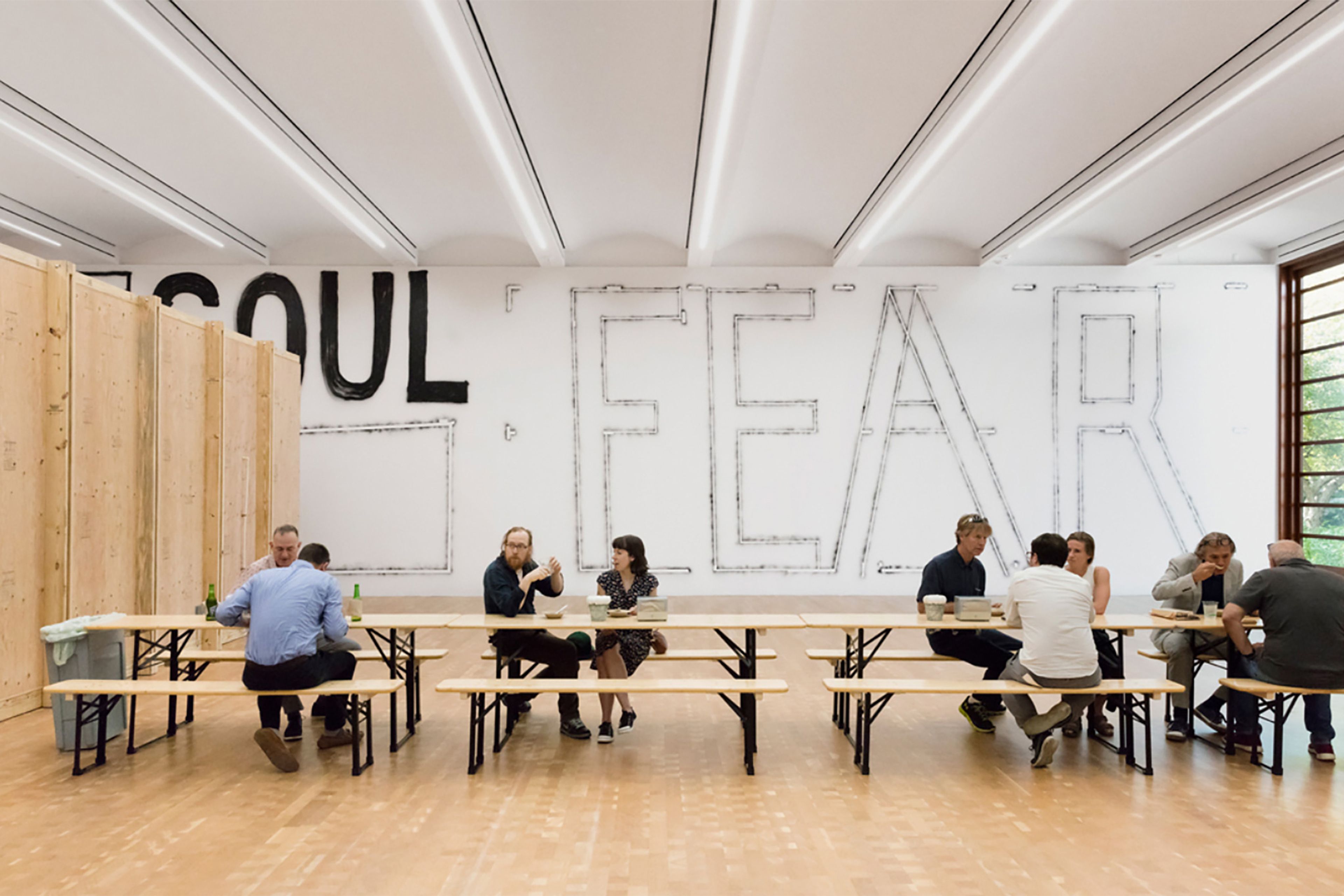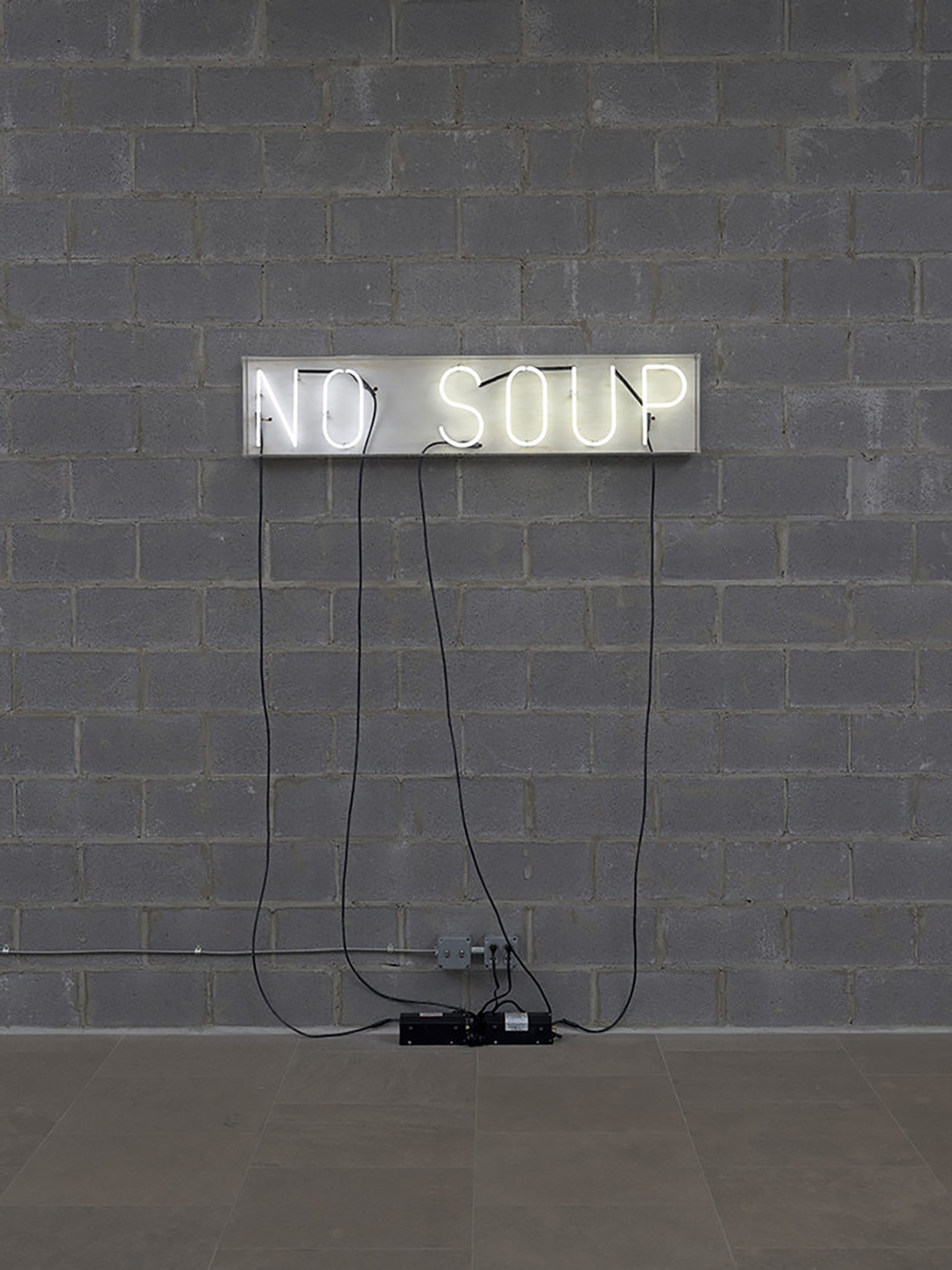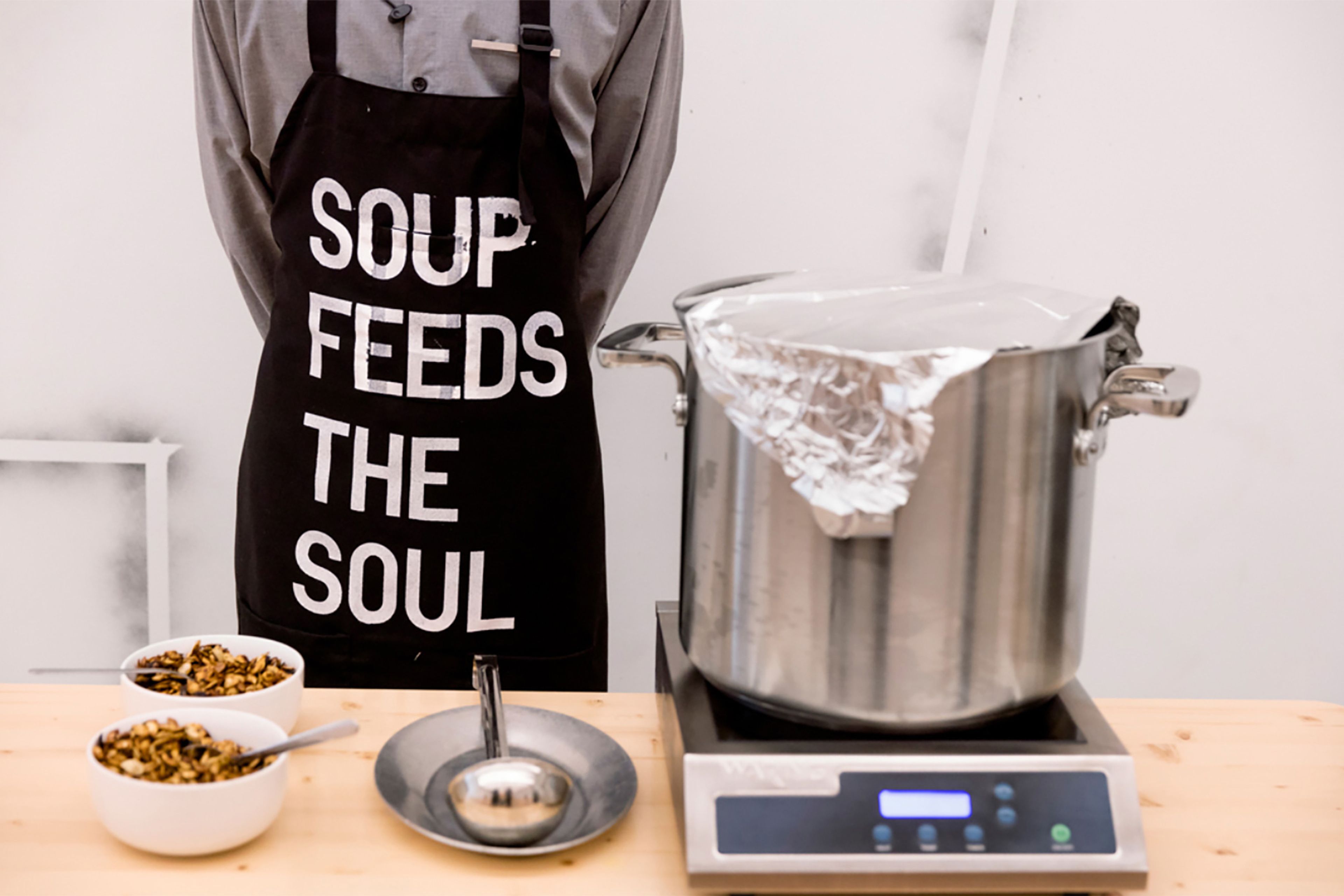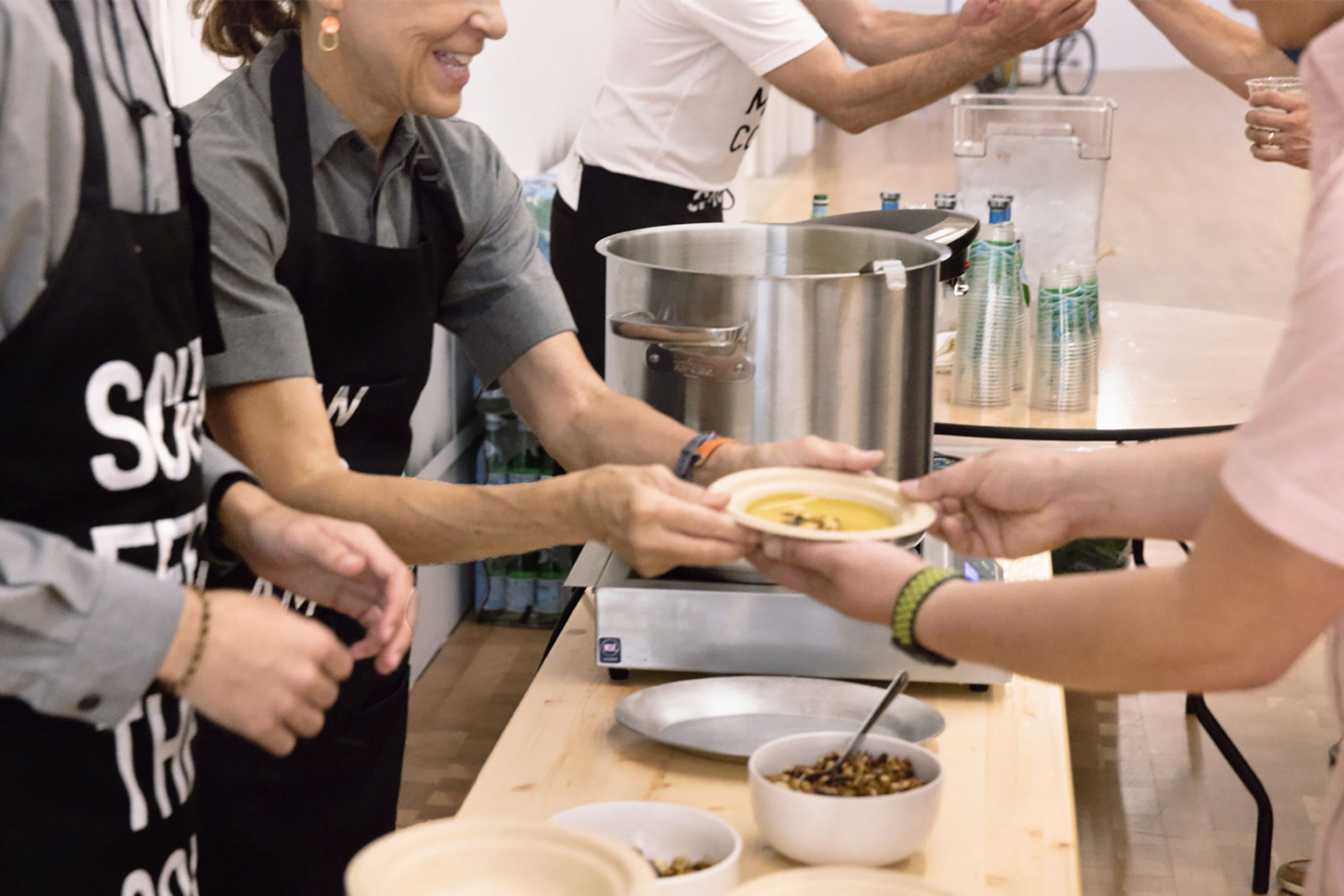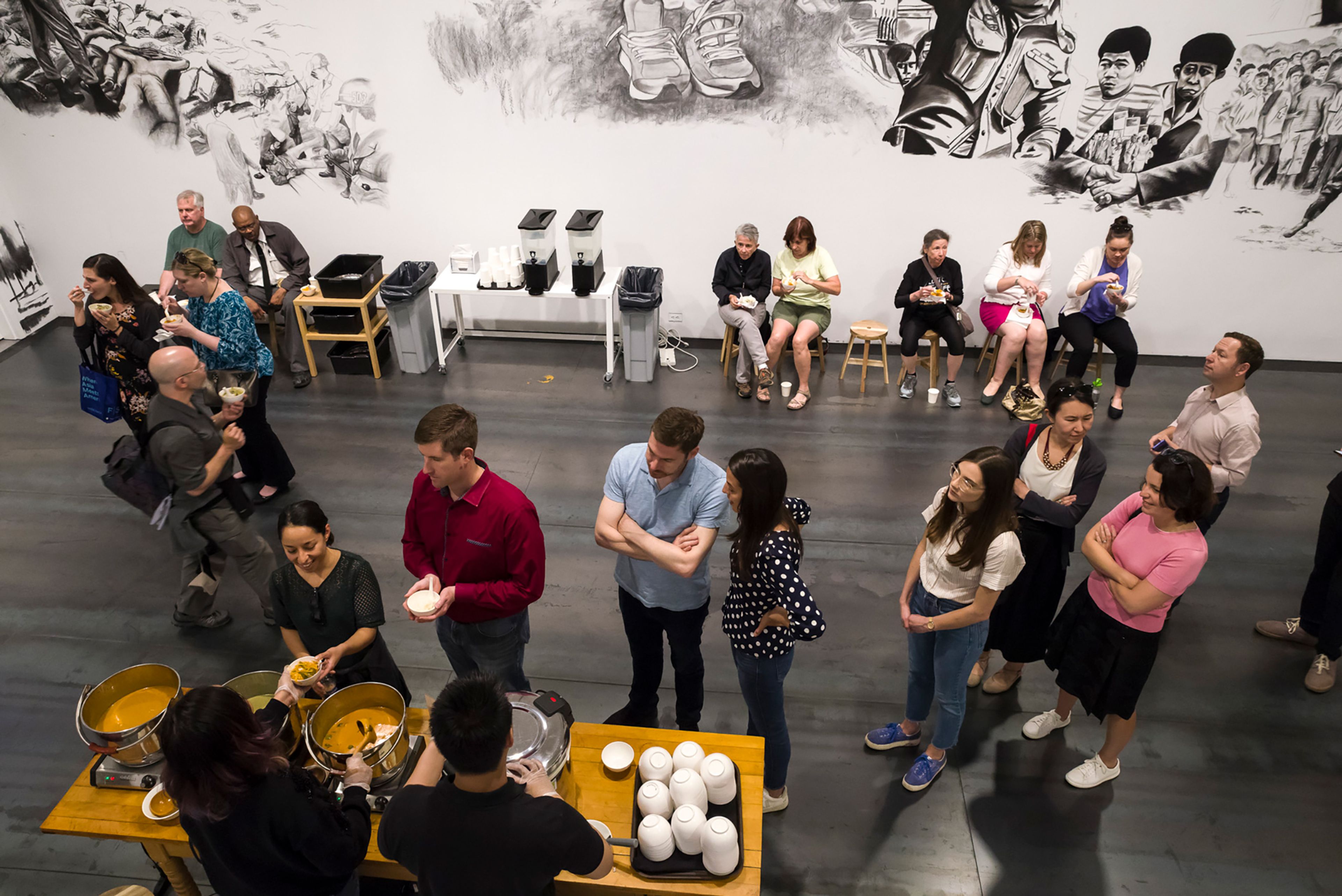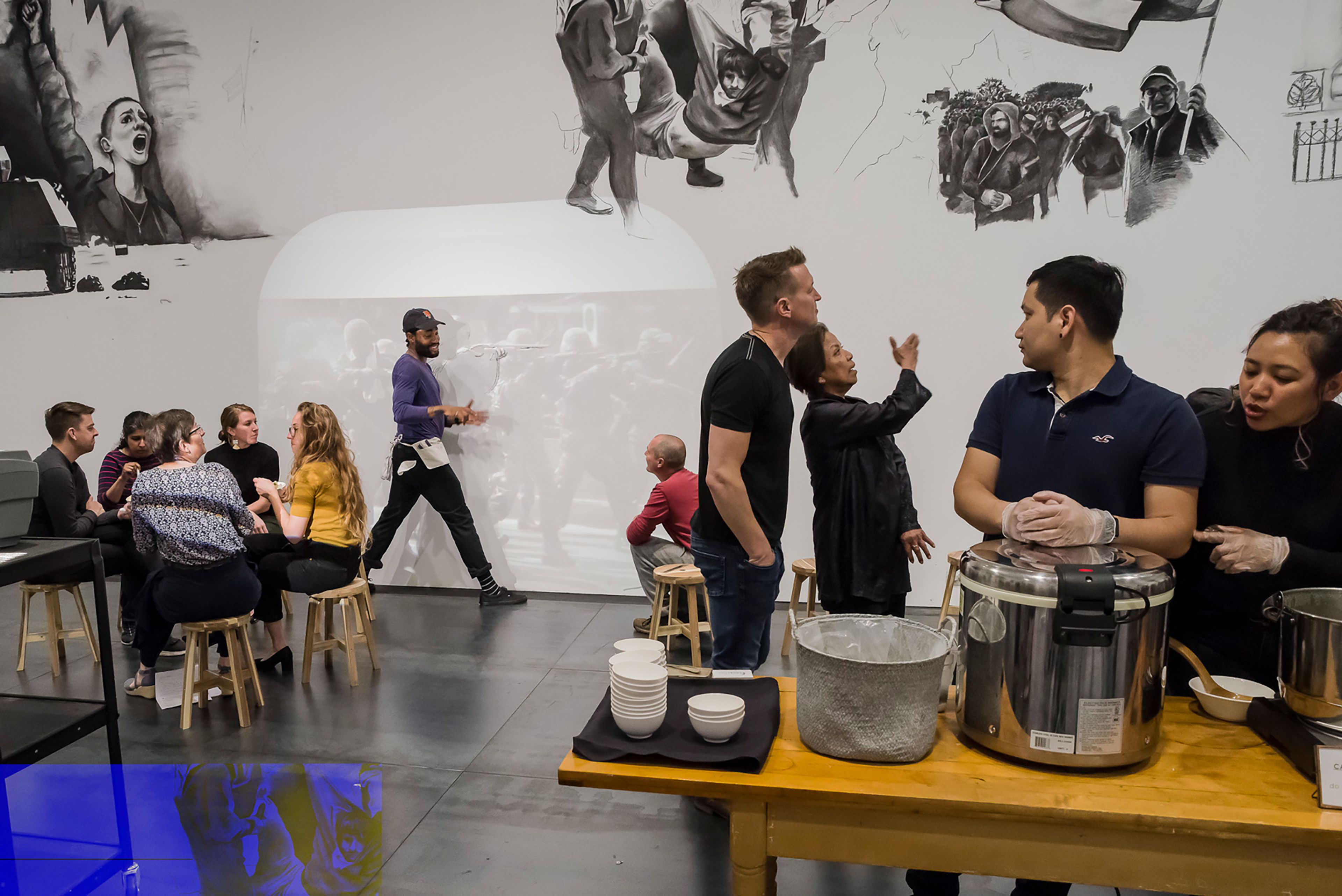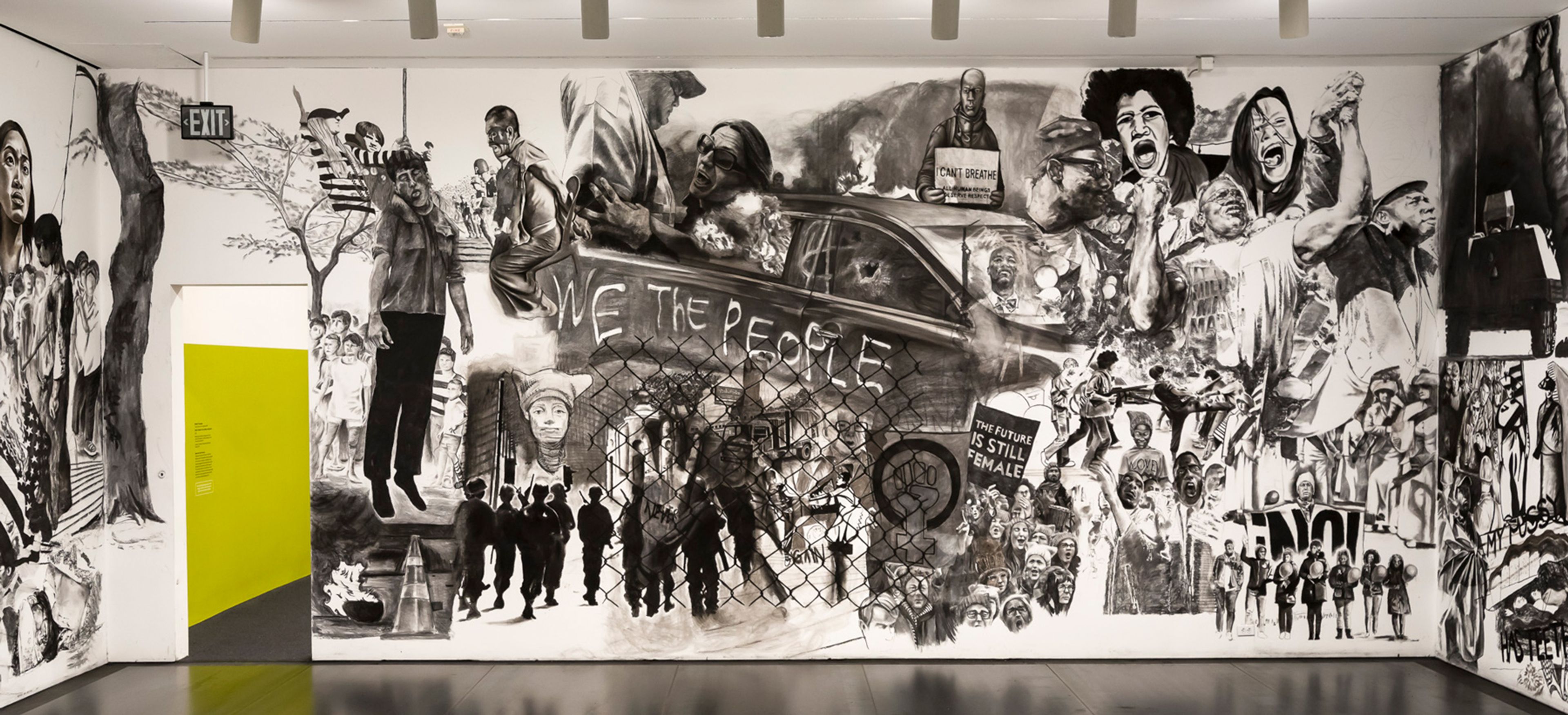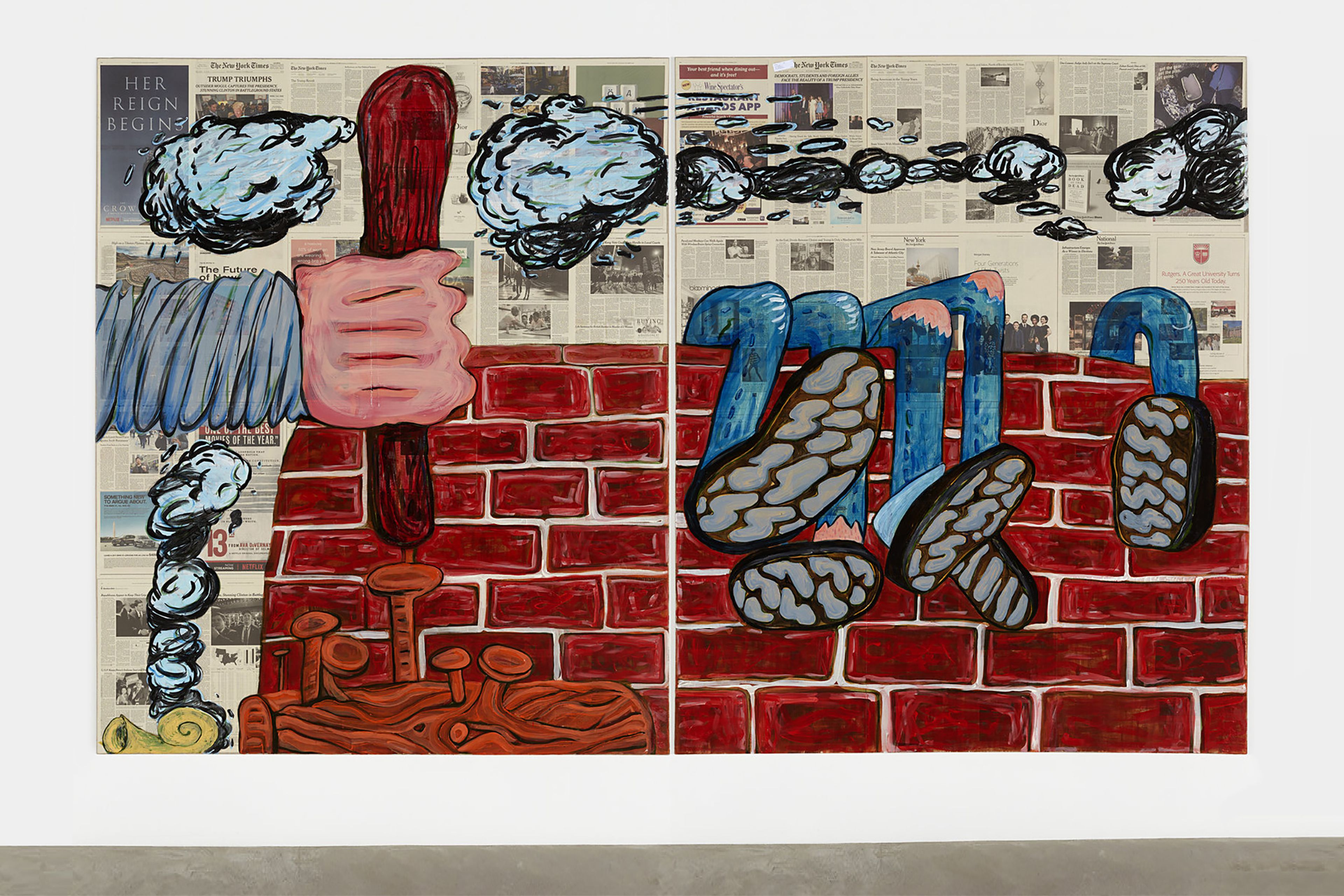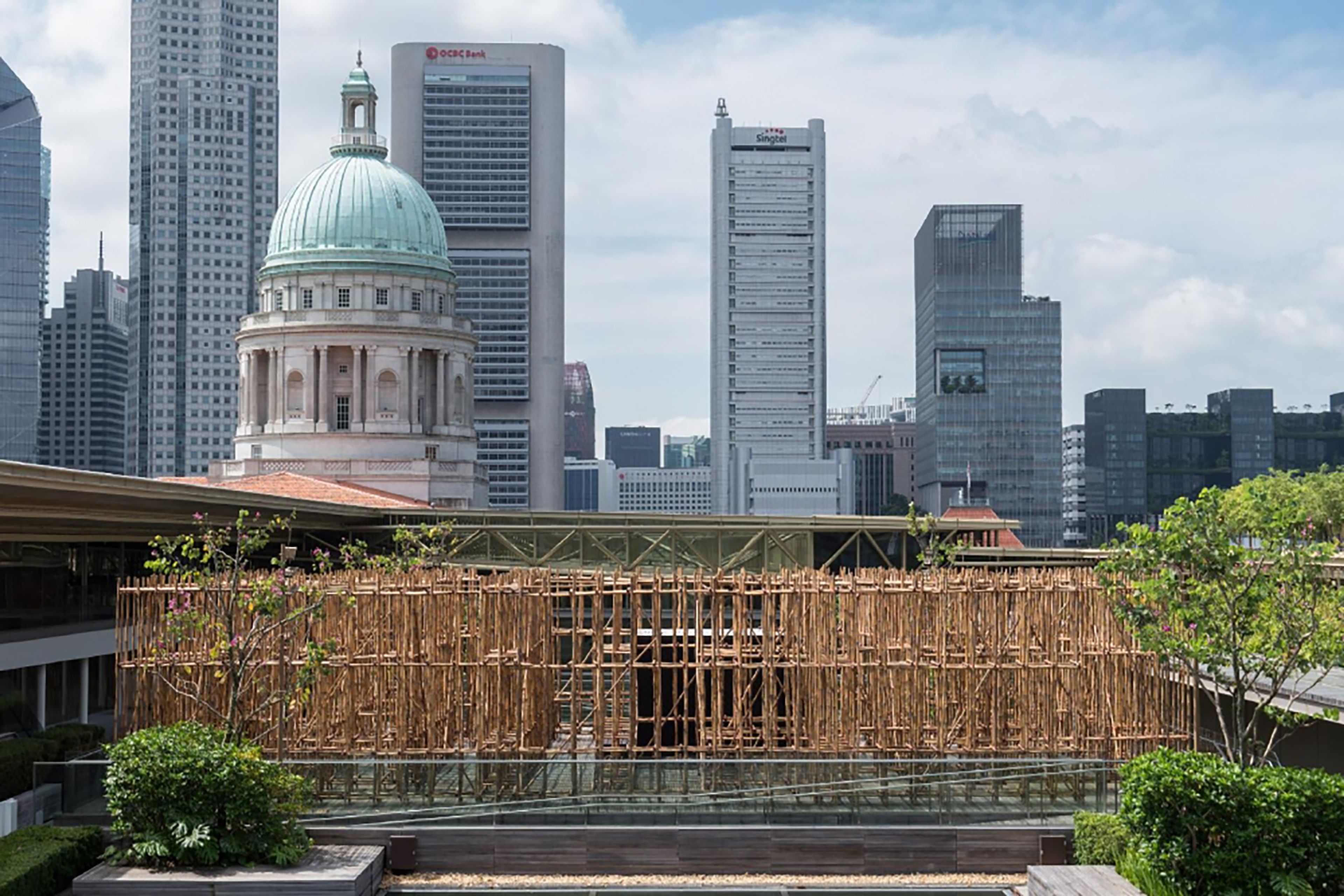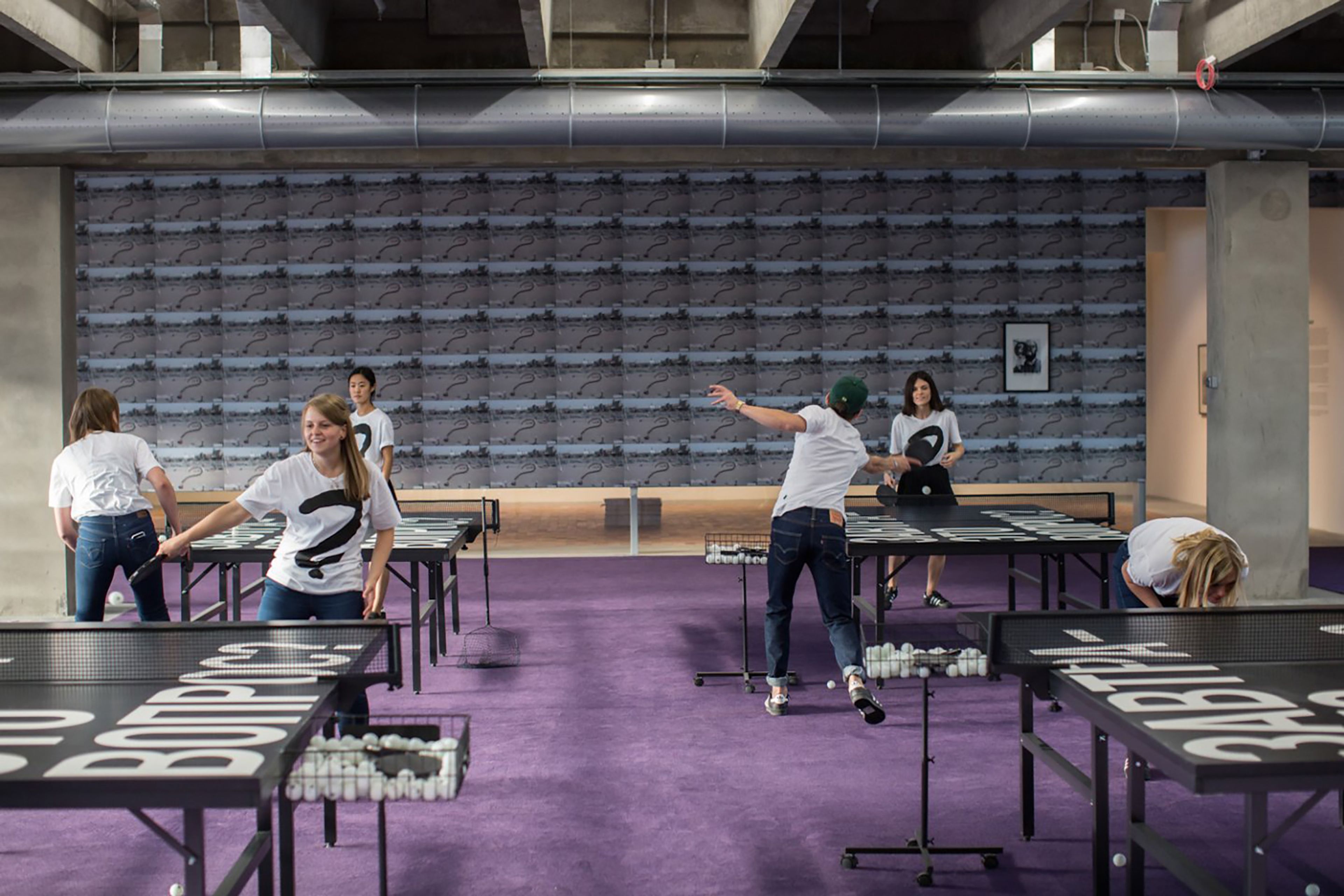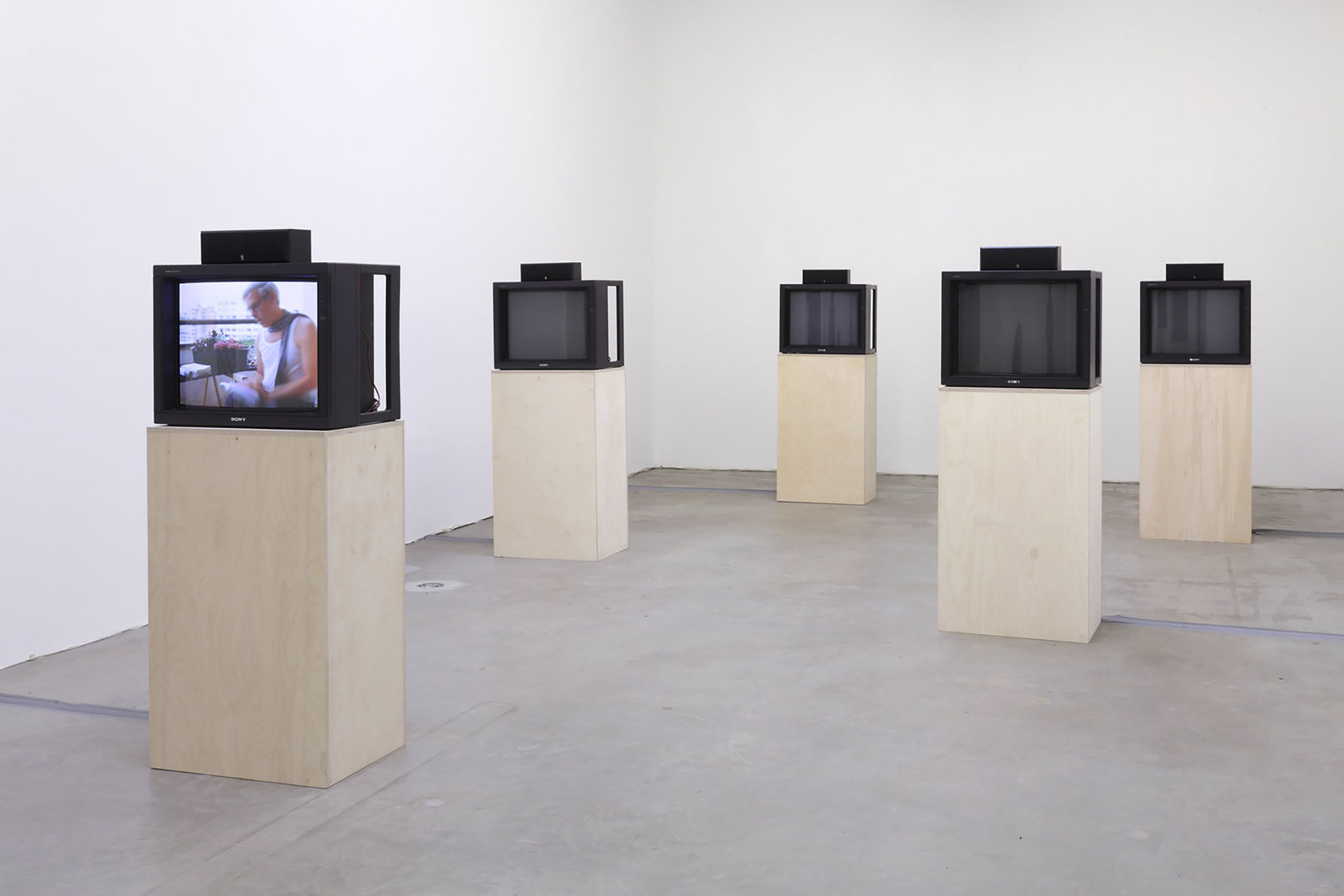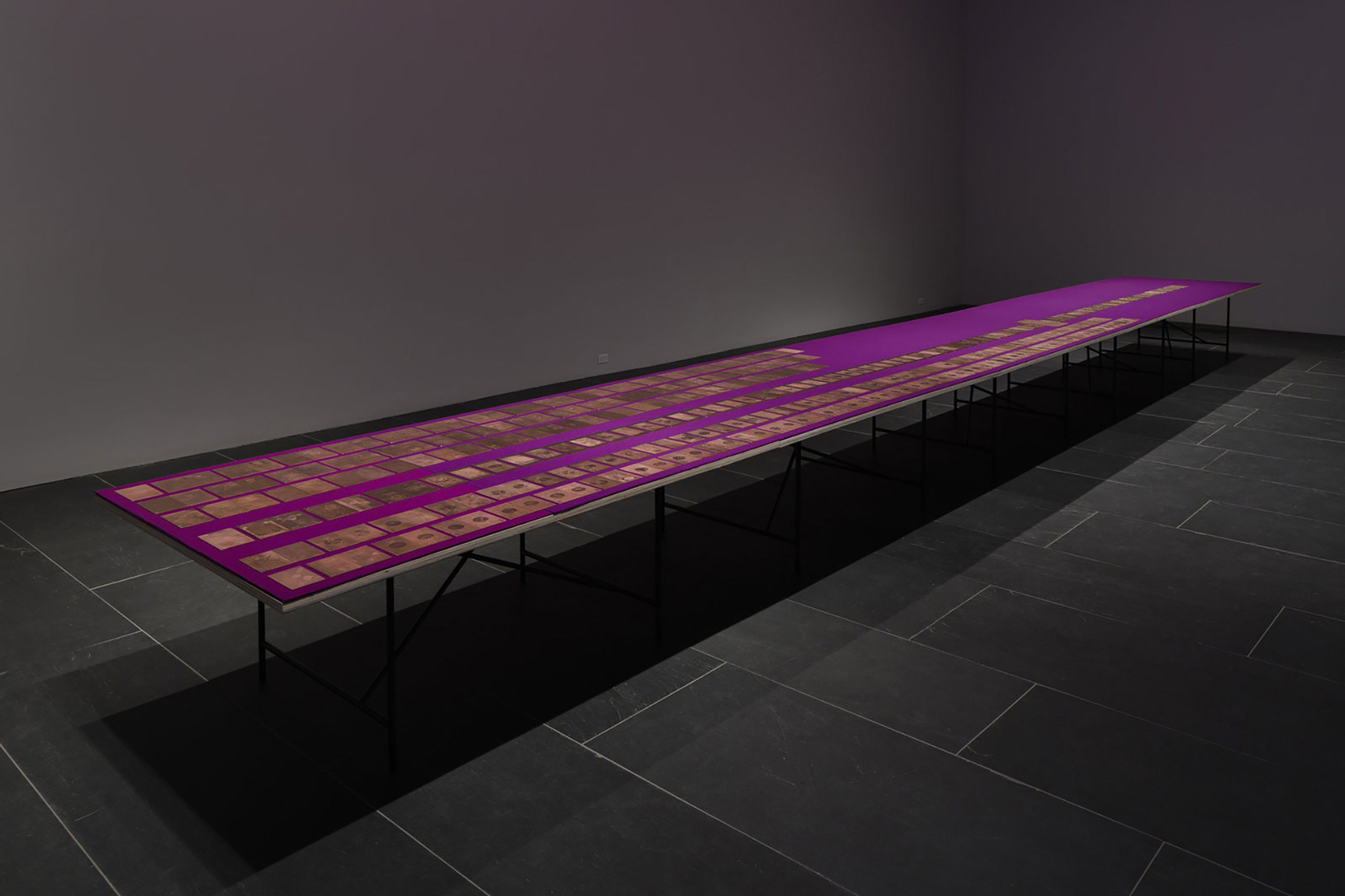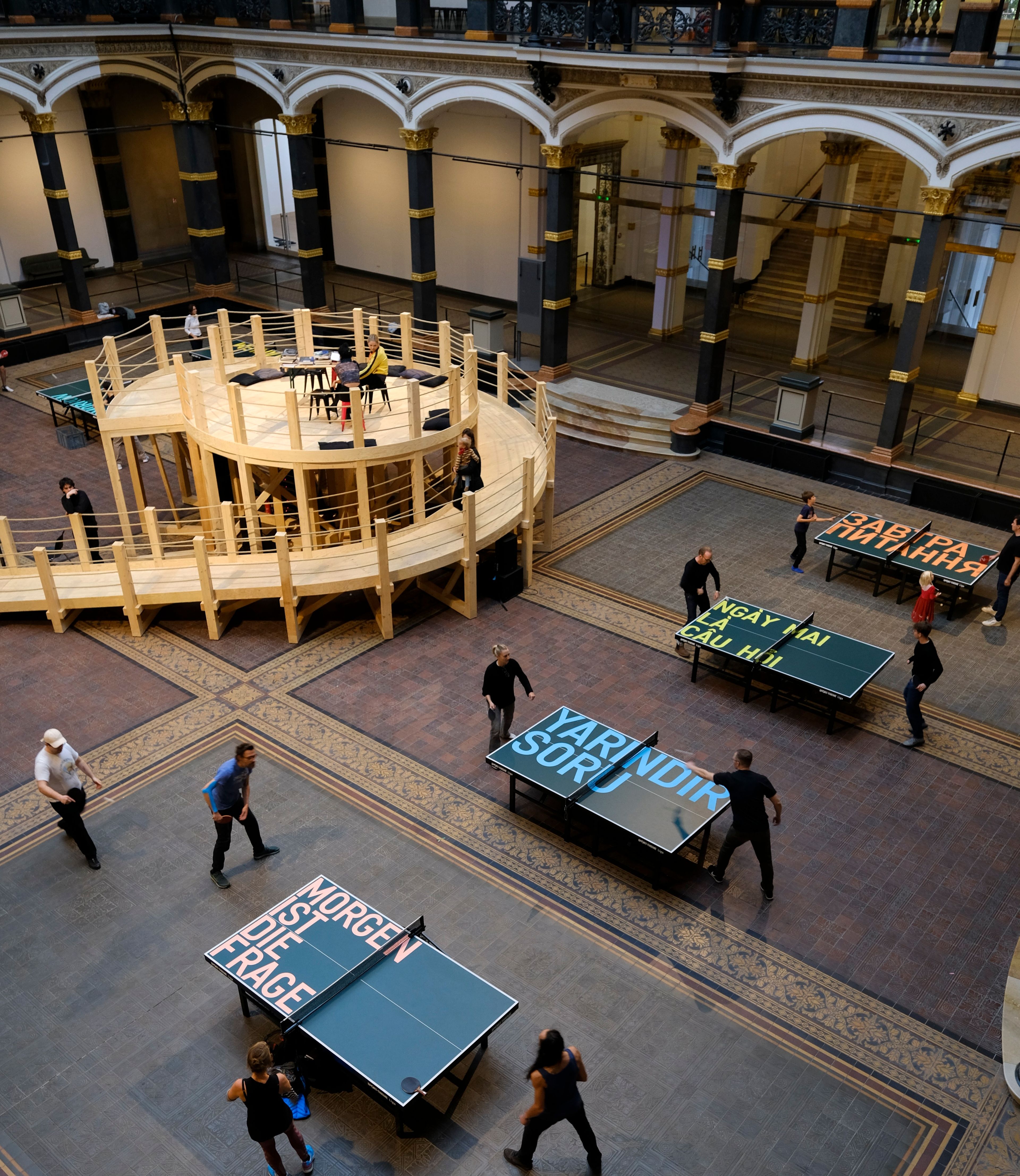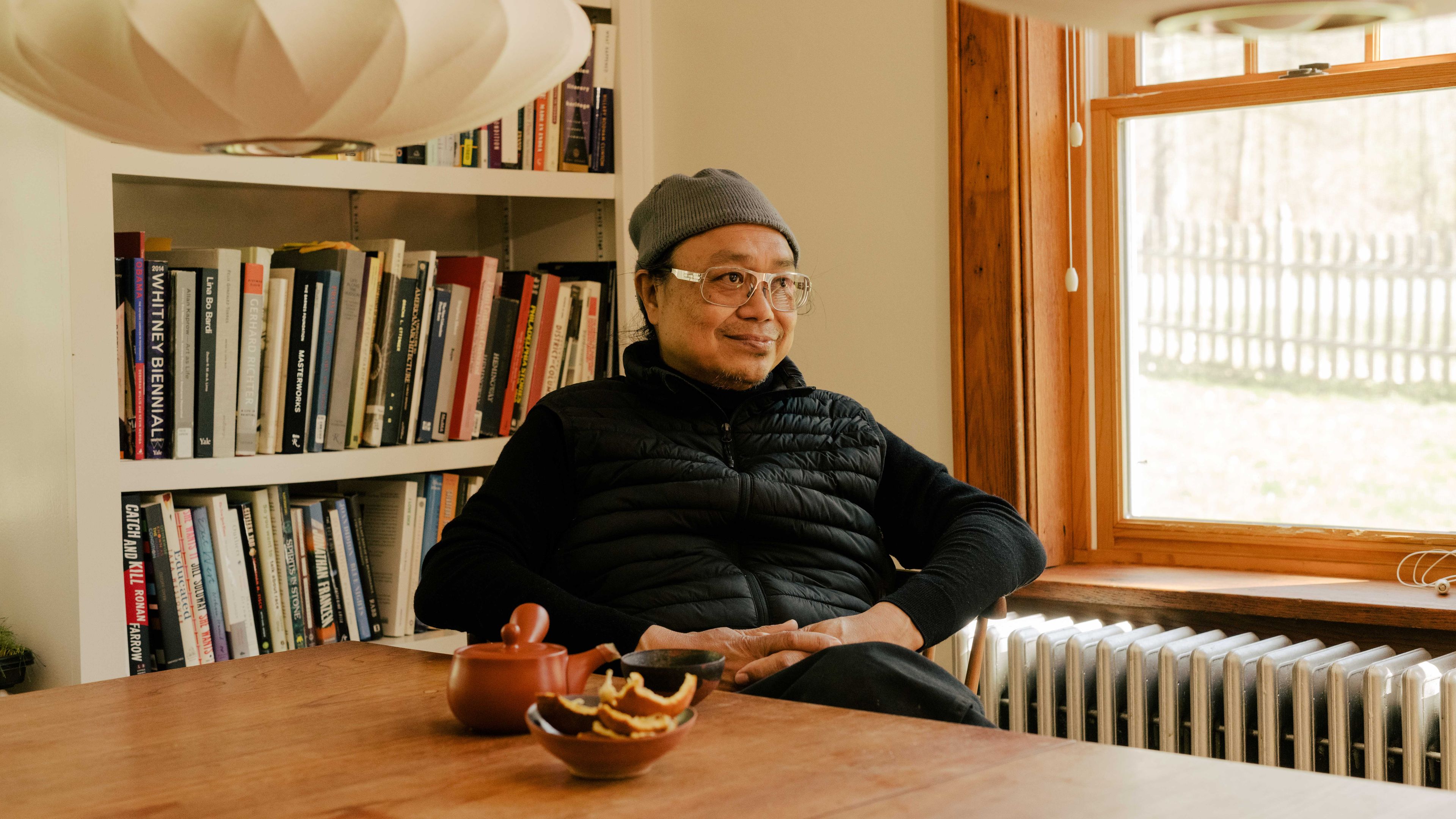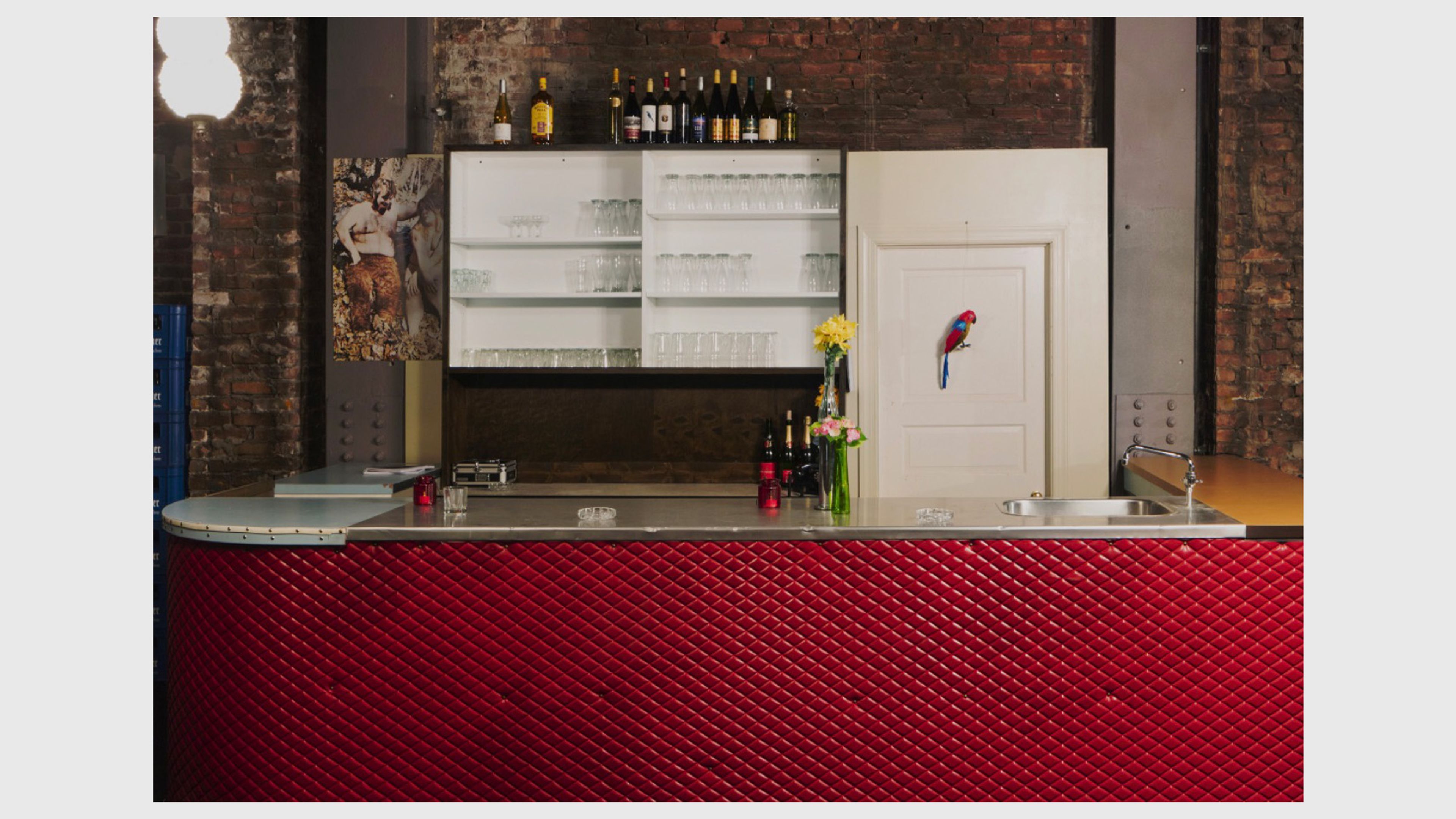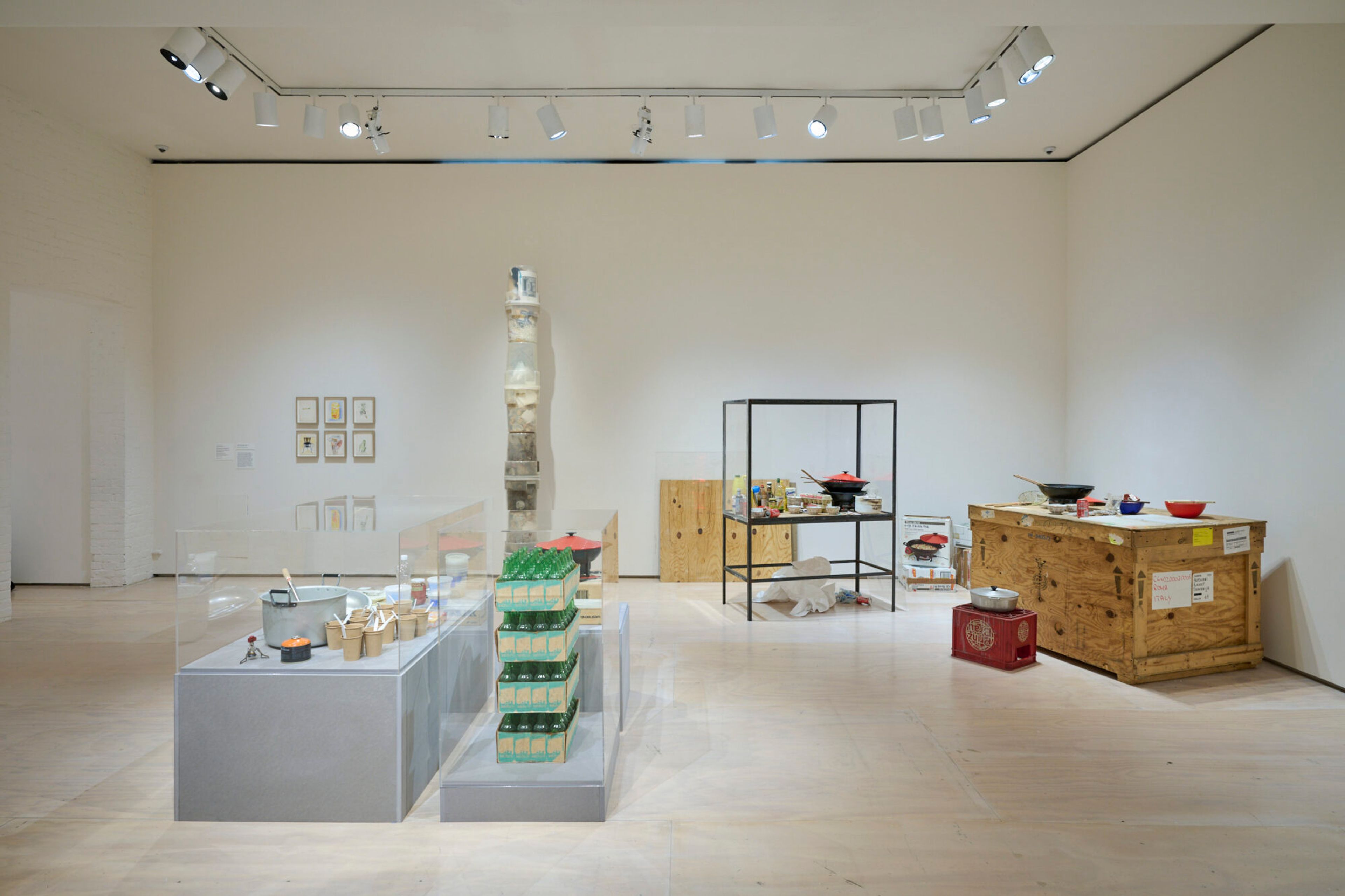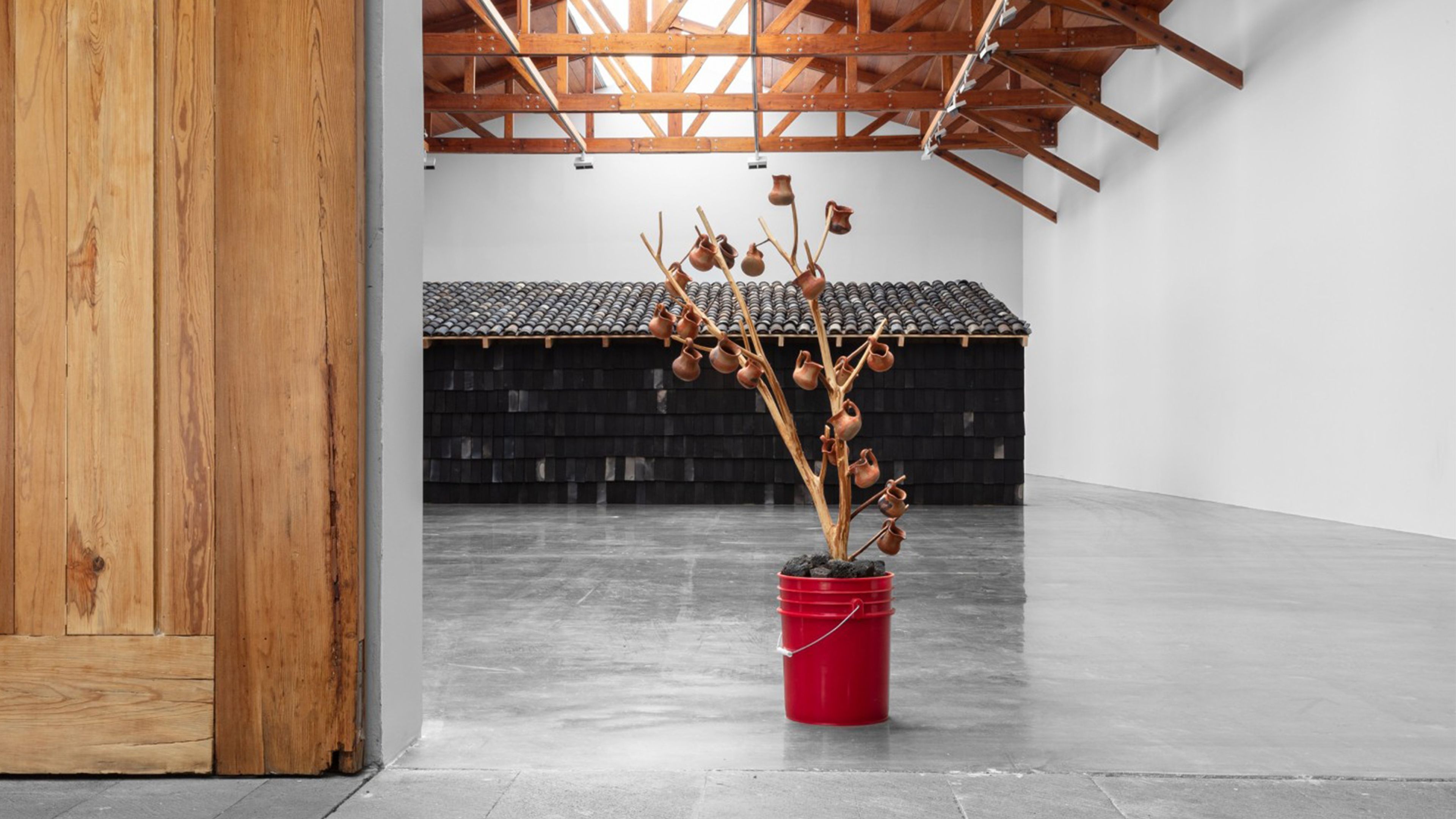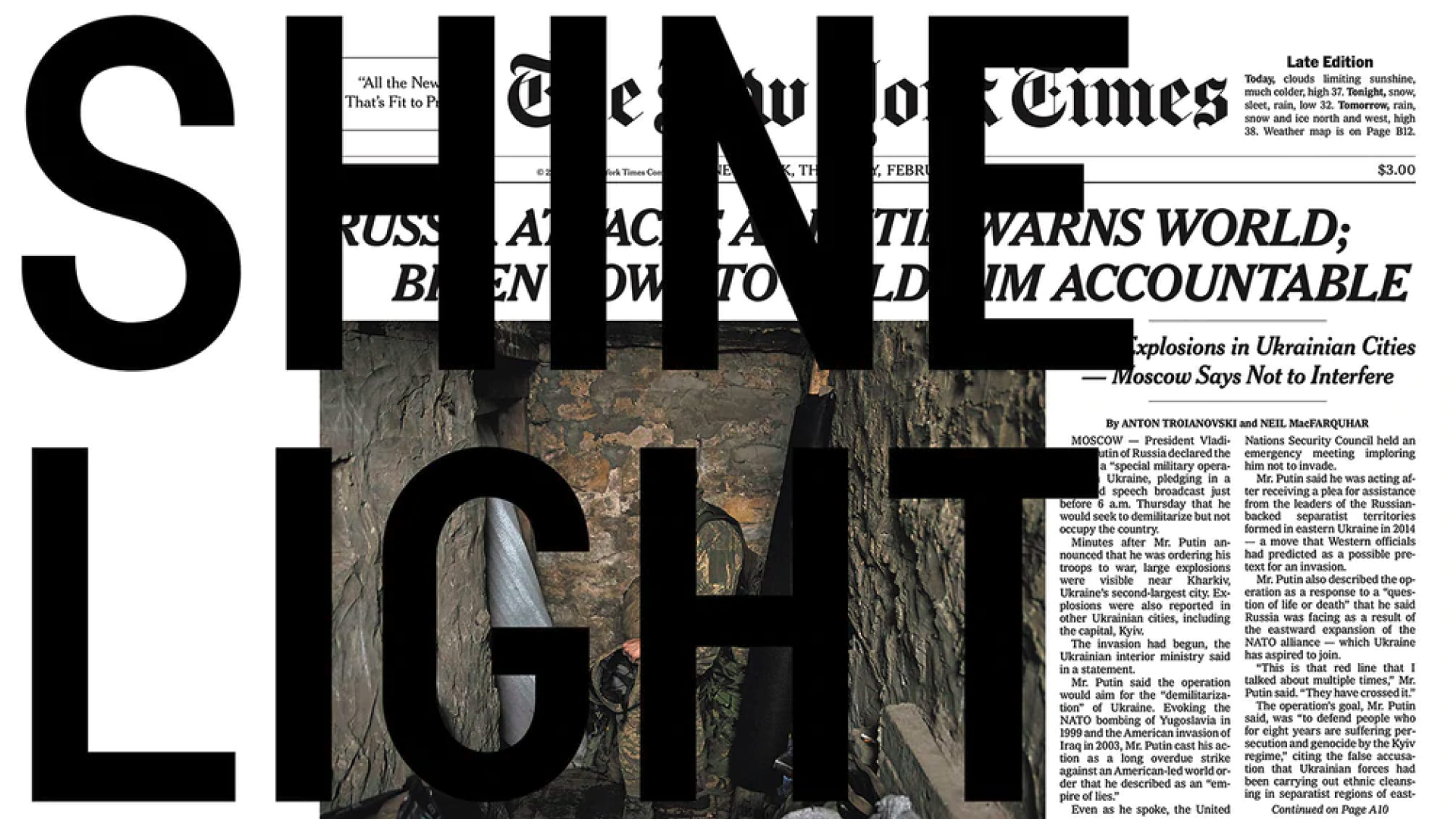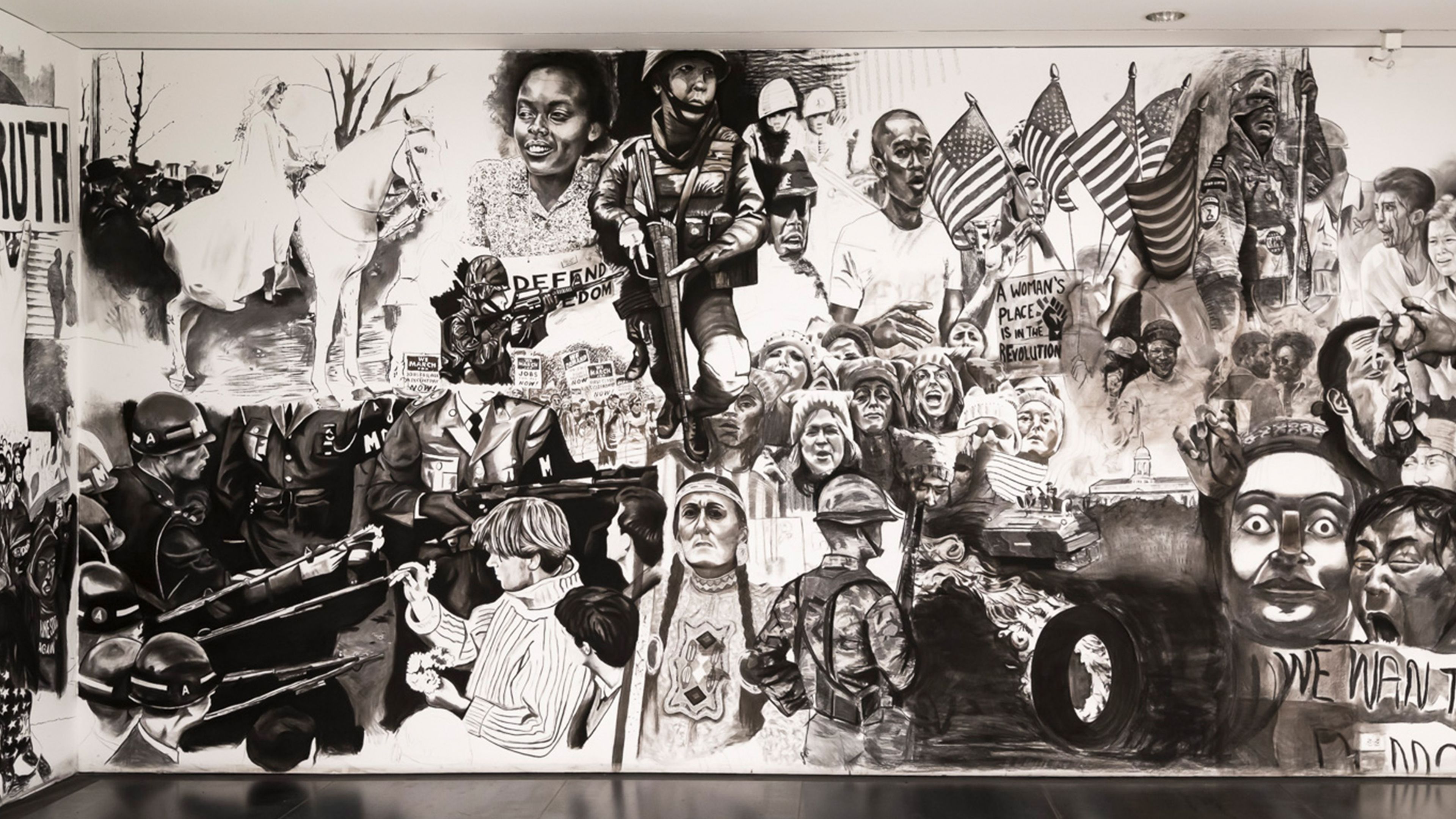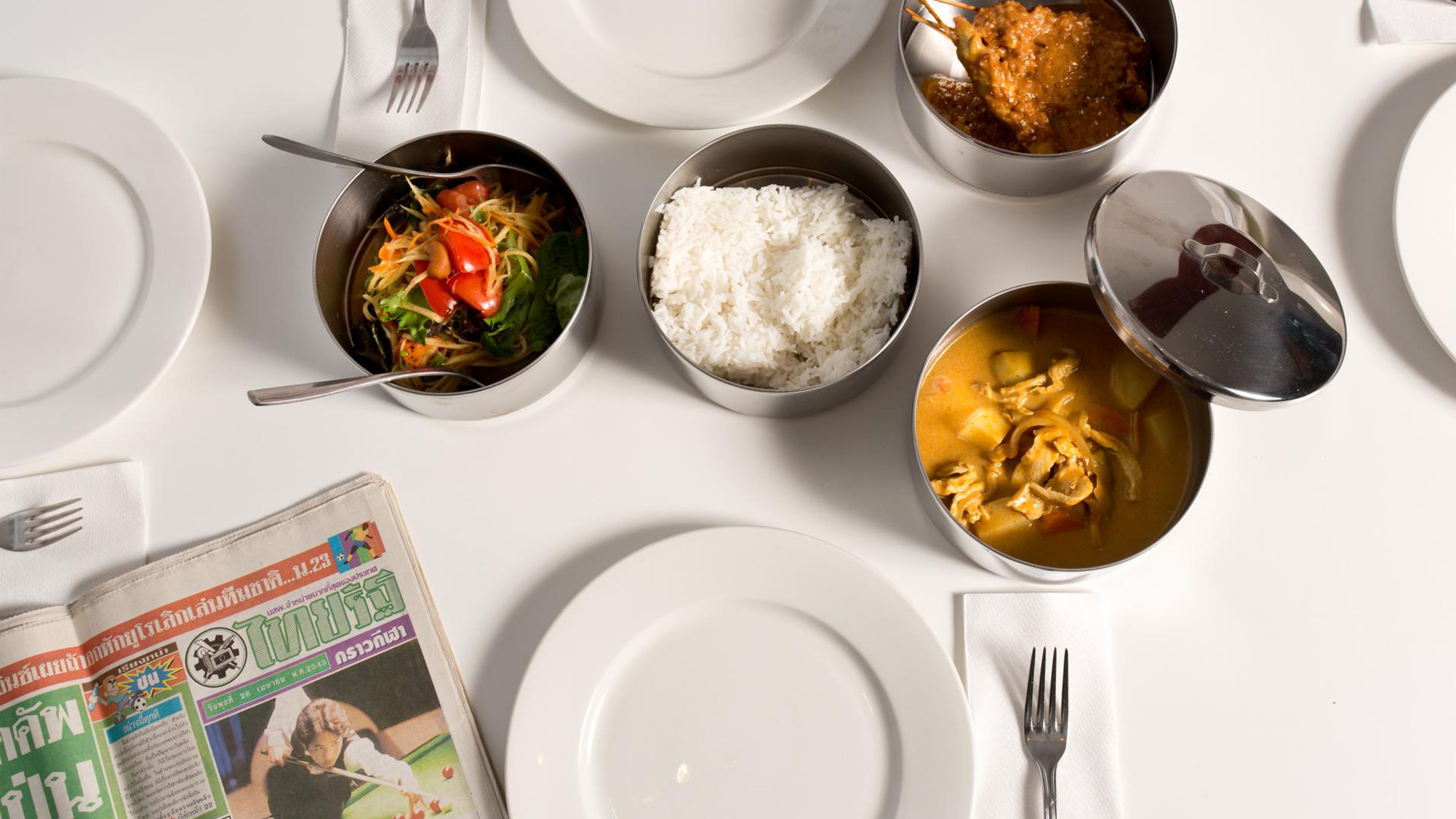Rirkrit Tiravanija
Rirkrit Tiravanija (b. 1961) is best known for his intimate, participatory installations that revolve around personal and shared communal traditions, such as cooking Thai meals, that are, in the words of curator Rochelle Steiner, “fundamentally about bringing people together.” At the forefront of the shift in avant-garde art practices in the 1990s away from traditional art objects and toward “relational aesthetics," Tiravanija has continually challenged and expanded the social dimension of art.
Learn MoreSurvey
Exhibitions

Explore Exhibitions
Artist News
Biography
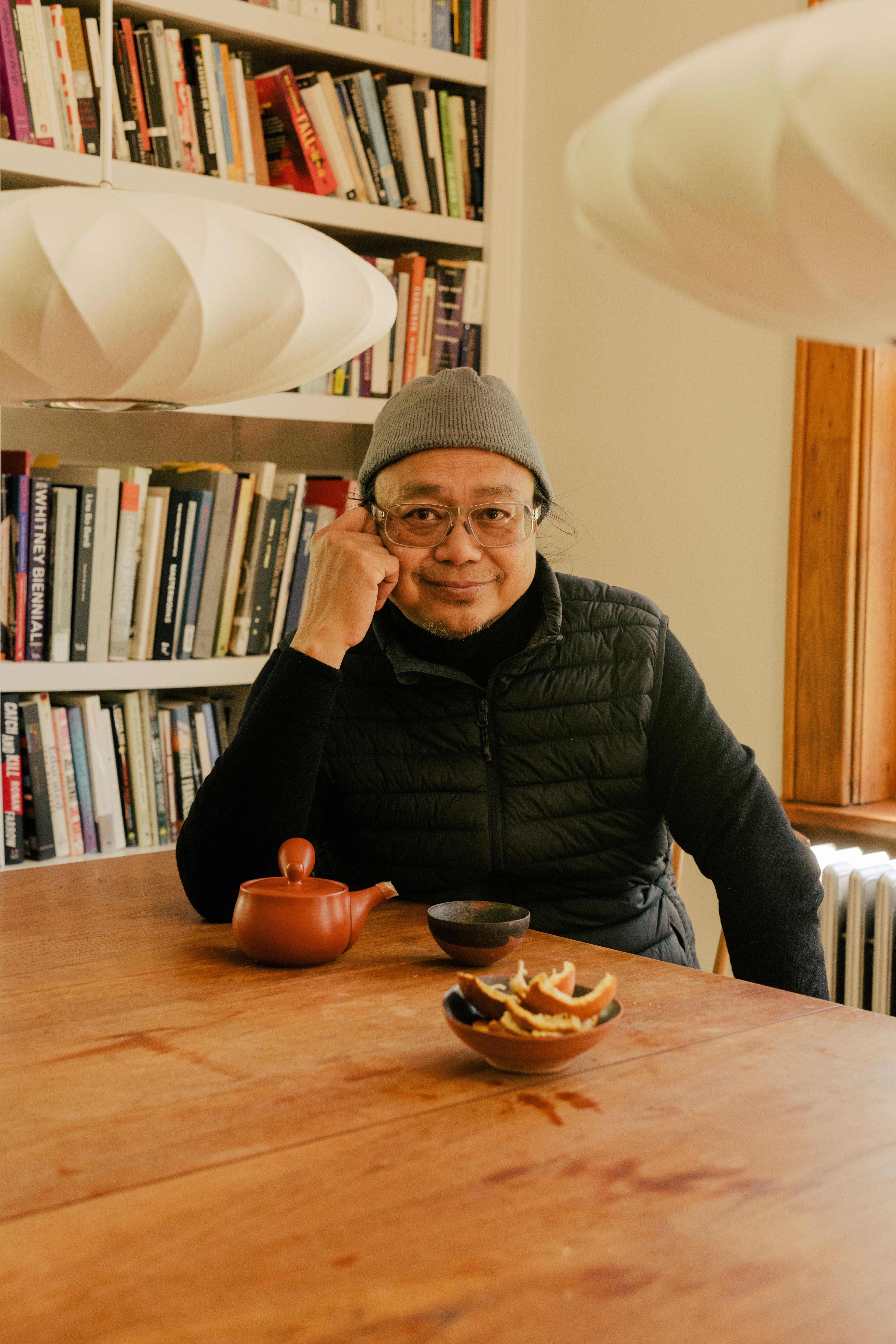
Rirkrit Tiravanija, 2021. Photo by Daniel Dorsa
Rirkrit Tiravanija was born in Buenos Aires in 1961. The son of a Thai diplomat, he moved frequently during his youth, growing up primarily in Thailand, Ethiopia, and Canada. He received his BA from the Ontario College of Art, Toronto, in 1984, and his MFA from the School of the Art Institute of Chicago in 1986. In 1985 to 1986, he participated in the prestigious Whitney Museum of American Art Independent Study Program, New York.
Tiravanija is best known for his intimate, participatory installations that revolve around personal and shared communal traditions, such as cooking Thai meals, that are, in the words of curator Rochelle Steiner, “fundamentally about bringing people together.”1 At the forefront of the shift in avant-garde art practices in the 1990s away from traditional art objects and toward “relational aesthetics” that incorporate diverse cultural spaces, practices, and temporalities, Tiravanija has continually challenged and expanded the social dimension of art, inviting people from all walks of life to inhabit the special and personal spaces that he constructs and to communally engage in shared rituals and actions. Through his real-time experiences, Tiravanija often addresses broader social and political concerns, such as protest movements against the Thai government, that go largely unaddressed in Western media. Over the course of his thirty-year career, he has also come to incorporate into his art and installations a wide variety of media, including painting, printmaking, video, photography, mixed-media assemblage, and music.
Since the early 1990s, Tiravanija has been featured in numerous solo exhibitions, many of which center around unique participatory installations or practices. He was the subject of two major retrospectives in the 2000s: Nothing: A Retrospective, at Chiang Mai University Art Museum, Thailand, in 2004, and A Retrospective (tomorrow is another fine day), which was presented simultaneously at Museum Boijmans Van Beuningen, Rotterdam, the Netherlands and Musée d’Art Moderne de la Ville de Paris in 2004 to 2005, and later at the Serpentine Gallery, London in 2005. A comprehensive catalogue for the retrospectives was published in 2007. Conceived as an artist’s book, the monograph also documents the trajectory of Tiravanija’s work, starting in 1989, using a unique storyboard-style presentation.
In 2019 to 2020, Tiravanija’s Fear Eats the Soul, a major solo exhibition featuring several interactive and participatory elements, including a soup kitchen and T-shirt workshop, was presented at Glenstone, Potomac, Maryland. Also in 2019, the Hirshhorn Museum and Sculpture Garden, Washington, DC, hosted Who’s Afraid of Red, Yellow, and Green, in which Tiravanija transformed the museum’s galleries into a communal dining space where visitors were served curry. The artist also created a large-scale mural on the museum walls over the course of the exhibition. From 2021 to 2022, the artist’s work untitled 2018 (the infinite dimensions of smallness) was installed in the sculpture garden of the Museum Dhondt-Dhaenens, Deurle, Belgium.
A major survey of Tiravanija’s work, Rirkrit Tiravanija: A LOT OF PEOPLE, was on view at MoMA PS1, New York, from October 12, 2023 until March 4, 2024. This exhibition was the artist’s largest to date, as well as one of the museum’s most extensive single-artist presentations. In September 2024, the solo exhibition Rirkrit Tiravanija: DAS GLÜCK IST NICHT IMMER LUSTIG (HAPPINESS IS NOT ALWAYS FUN) opened at the Gropius Bau, Berlin.
Other important solo exhibitions of Tiravanija’s work have been presented at prominent institutions worldwide, including the Kölnischer Kunstverein, Cologne (1996); The Museum of Modern Art, New York (1997); Philadelphia Museum of Art (1998); Wexner Center for the Arts, Columbus, Ohio (1999); Los Angeles County Museum of Art (1999); Center for Contemporary Art Kitakyushu, Japan (2000); Portikus, Frankfurt (2001 and 2004); Kunsthall Oslo (2001); Secession, Vienna (2002); Galerie für Zeitgenössische Kunst, Leipzig, Germany (2003); Solomon R. Guggenheim Museum, New York (2005); The Drawing Center, New York (2008); Fridericianum, Kassel, Germany (2009); Centro de Arte Contemporáneo de Málaga, Spain (2009); Mildred Lane Kemper Art Museum, St. Louis (2009); Kunsthalle Bielefeld, Germany (2010); Hayward Gallery, London (2012); Centre Georges Pompidou, Paris (2012); Centre d’Art Contemporani, Barcelona (2014); Modern Art Museum of Fort Worth, Texas (2014); Garage Museum of Contemporary Art, Moscow (2015); Centro Cultural Banco do Brasil, Brasília (2015); Stedelijk Museum, Amsterdam (2016); and National Gallery of Singapore (2018).
The artist’s work was featured in the Venice Biennale in 1993, 1999, 2011, and 2015. He also exhibited at the São Paulo Biennial in 2006, and the Whitney Biennial in 1995 and 2006. At the 2012 Paris Triennale, curated by Okwui Enwezor, Tiravanija presented Soup/No Soup (2011–2012), a twelve-hour banquet that was open to all visitors at the Grand Palais.
Among his many awards and honors, Tiravanija was the recipient of the 2004 Hugo Boss Prize from the Solomon R. Guggenheim Foundation.
In 2007, David Zwirner presented its first exhibition with Tiravanija, which featured the artist’s Untitled 1992 (Free), that is in the collection of The Museum of Modern Art, New York. In 2023, a solo exhibition of the artist’s work, The Shop, was on view at David Zwirner, Hong Kong.
Work by the artist is represented in international museum and public collections, including Astrup Fearnley Museum of Modern Art, Oslo; Carnegie Museum of Art, Pittsburgh; Cornell Fine Arts Museum, Rollins College, Winter Park, Florida; Fond National d’Art Contemporain (FNAC), Paris; Fond Régional d’Art Contemporain (FRAC) Occitanie Montpellier, France; Fondazione Sandretto Re Rebaudengo, Turin; Fundación Tantica, Buenos Aires; Inhotim Institute, Brumadinho, Brazil; Le Consortium, Dijon, France; Louisiana Museum for Modern Art, Humlebæk, Denmark; Migros Museum für Gegenwartskunst, Zurich; Museo de Arte Contemporáneo de Castilla y León, Spain; Museum of Contemporary Art, Bangkok; Museum of Contemporary Art, Los Angeles; The Museum of Modern Art, New York; Neue Nationalgalerie, Berlin; Saint Louis Art Museum, Missouri; Sammlung zeitgenössischer Kunst der Bundesrepublik Deutschland, Berlin; San Francisco Museum of Modern Art; Solomon R. Guggenheim Museum, New York; Tate, United Kingdom; and the Walker Art Center, Minneapolis.
Tiravanija lives and works in New York, Berlin, and Chiang Mai.
1 Quoted in Calvin Tomkins, “Shall We Dance?,” The New Yorker , 2005.

Request more information
